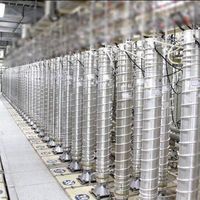Iran starts manufacturing key radiotherapy material at nuclear facility
Iran says it has officially launched the production line for Iridium Hexafluoride (IR46) at the Shahid Raeisi Nuclear Site in Isfahan (UCF site) on Saturday amid US pressure to curb Iran's nuclear program.
Iridium Hexafluoride (IR46) has multiple applications, including in brachytherapy (internal radiotherapy), low-dose medical radiography, and the production of IR192, which serves as a substitute for cobalt-60 (Co-60) in radiotherapy, according to state news ISNA. Additionally, Iran says IR192 is widely used as a radiography source, particularly in the oil and gas industries, non-destructive testing (NDT), and radiobiology research to study the effects of radiation on living tissues.
With the successful production of IR46, Iran says it joins a select group of countries possessing this advanced technology, opening possibilities for exporting the product to other nations.
Mohammad Eslami, the Head of the Atomic Energy Organization of Iran (AEOI), visited Isfahan on Saturday to inaugurate several key projects, including the Iridium Hexafluoride (IR46) production line, a comprehensive technical safety testing facility, a semi-industrial sintering furnace for fuel pellets, and a resistance welding (RW) machine at the Shahid Raeisi Nuclear Site.
The Trump administration has reinstated its "maximum pressure" policy on Iran, emphasizing that sanctions will remain unless Tehran agrees to a new deal with the US.
Under pressure for uranium enrichment and alleged secret nuclear activities, Iran always insists that its nuclear program is only for peaceful purposes and scientific advancement.
While President Trump has expressed openness to negotiations, Iran's Supreme Leader Ali Khamenei firmly rejected the idea, calling talks with Washington unwise and dishonorable. Khamenei criticized the US for withdrawing from the 2015 nuclear deal, labeling it an act of betrayal. Despite Trump's stated desire for peace, he remains committed to preventing Iran from acquiring nuclear weapons, maintaining a hardline stance unless a new agreement is reached.








